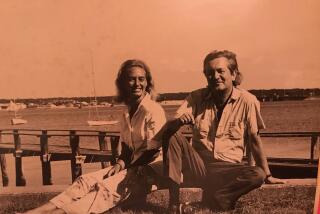Love and the Tragedy of Being Too Late
- Share via
Meet the new “Bridges of Madison County,” 1997. “A Cup of Tea” takes us out of Iowa and back to the drawing rooms of New York in 1917. Henry James and Robert James Waller are strange bedfellows, but there is always a lowest common denominator and often it’s infidelity.
There you have it. Common or no, there is the weeping, the lost opportunity, the aching heart, the sense of duty, the sense of betrayal, the innocent victims. As “Casablanca” etched forever in our memory, the forgone opportunity for lifelong love has, at times, unbearable poignancy. Just don’t talk about it in public or you will sound ridiculous. Read these books in absolute solitude and snivel away in privacy. This is what our linguistic forebears meant by stiff upper lip.
Before I give away the timeless plot, there is another problem. Amy Ephron, the author of “A Cup of Tea,” was “inspired” by a short story written by Katherine Mansfield. For some reason, that story is not named, although there is good reason to believe that it is “Bliss,” written in 1919. Both “Bliss” and “A Cup of Tea” are about women who bring another woman into their homes only to have their husband’s hearts stolen by their visitors. Both perform an act of kindness and hospitality and are rewarded by betrayal. At this point we leave the vast interior landscapes of Katherine Mansfield for the somewhat narrower (if more accessible, which is no mean thing) drama and plot of Amy Ephron.
Rosemary Fell is a society girl who has, thinks her widowed father, in the churning climate of war, “lost the society she was raised in.” When she sees a young woman, Eleanor Smith, standing under a lamppost in the rain, she impulsively brings her home for a cup of tea. “Think how she would feel if she could successfully show this poor creature that life could be wonderful, that all women were sisters. . . . What good was it to have power, if one couldn’t be beneficent some of the time.” This act, made hollow by Rosemary’s hollowness (a feature that makes it easier to let her suffer her fate), backfires voluptuously when Philip, Rosemary’s handsome but repressed fiance (yaddayddayadda) falls instantaneously and irrevocably and insanely in love with Eleanor (who is stunningly beautiful in ways that Rosemary could never be).
Rosemary’s lifelong friend, Jane Howard, finds Eleanor a job in a hat shop, where Philip discovers her, weeks before he is sent off to war. There are mercifully few “we mustn’ts,” it being wartime and all, and Eleanor being a brave new working girl. The relationship is consummated and Philip does the expected thing, which is to marry Rosemary.
He goes off to France having unknowingly created a baby with Eleanor. Eleanor, in spite of her practical nature, finds that she has done the thing her mother always warned her against: “She had fallen in love. And she knew in her heart, even though the odds weren’t in her favor, there wasn’t anything else worth waiting for.”
Months later, Rosemary is informed of Philip’s death. But there was no body, and of course he returns, having fulfilled his duty and ready to do the right thing, which now means: follow his heart. Of course it’s all too late, which seems to be the main lesson this book shares with “The Bridges of Madison County”: Don’t let it be too late.
The book is smooth and seamlessly written with a screenwriter’s sure hand for manipulation in short spaces. It’s a fine book, but the specter of Katherine Mansfield, with her characters that expanded to fill the spaces she gave them, rather than being limited by them, or cowed by plot and setting, hovers in the background.
More to Read
Sign up for our Book Club newsletter
Get the latest news, events and more from the Los Angeles Times Book Club, and help us get L.A. reading and talking.
You may occasionally receive promotional content from the Los Angeles Times.









